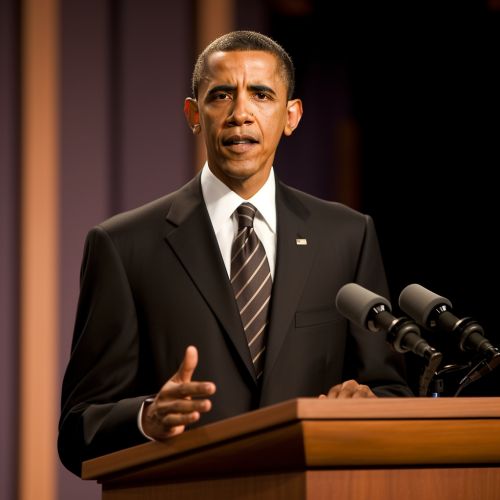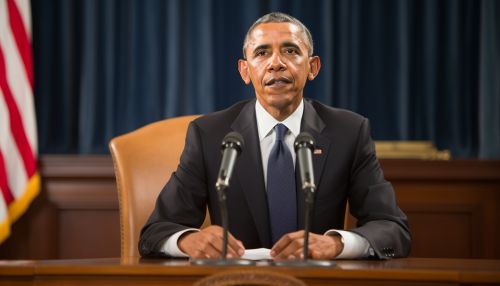Presidency of Barack Obama
Early Life and Career
Barack Hussein Obama II was born on August 4, 1961, in Honolulu, Hawaii. He is the son of Barack Obama Sr., a Kenyan economist, and Stanley Ann Dunham, an anthropologist from Wichita, Kansas. Obama spent most of his early life in Hawaii, with a brief period in Indonesia from 1967 to 1971, following his mother's second marriage to Lolo Soetoro.
Obama graduated from Columbia University in 1983 with a degree in political science. After working in the business sector for a few years, he moved to Chicago, where he became a community organizer for a church-based group seeking to improve living conditions in poor neighborhoods plagued with crime and high unemployment.
In 1988, Obama enrolled at Harvard Law School, where he was the first African American president of the Harvard Law Review. After graduation, he returned to Chicago to practice as a civil rights lawyer and teach constitutional law at the University of Chicago Law School from 1992 to 2004.


Political Career
Obama's political career began in the Illinois State Senate, serving from 1997 to 2004. He gained national attention during his campaign to represent Illinois in the United States Senate in 2004, delivering a keynote address at the Democratic National Convention that highlighted the themes of unity and diversity that would become hallmarks of his subsequent political career.
In the Senate, Obama worked on legislation that focused on government transparency and ethics reform, as well as issues related to health care and nuclear proliferation.
Presidential Campaigns
In February 2007, Obama announced his candidacy for the presidency of the United States. His campaign was notable for its extensive use of social media to organize volunteers, raise campaign funds, and communicate with constituents.
In the 2008 Democratic primary, Obama faced off against former First Lady and then New York Senator Hillary Clinton. After a closely contested primary, Obama secured the Democratic nomination and chose Delaware Senator Joe Biden as his running mate.
In the general election, Obama faced Republican nominee John McCain, a senator from Arizona. Obama's campaign focused on the themes of hope and change, and he promised to end the war in Iraq, increase energy independence, and provide universal health care. On November 4, 2008, Obama was elected the 44th president of the United States, becoming the first African American to hold the office.
Obama was reelected in 2012, defeating Republican nominee Mitt Romney, the former governor of Massachusetts. His second term focused on issues such as gun control, immigration reform, and the implementation of the Affordable Care Act, also known as Obamacare.
Presidency
Obama's presidency was marked by significant policy changes in areas such as health care, financial regulation, and foreign policy. His administration also faced significant challenges, including the ongoing wars in Iraq and Afghanistan, the economic recession, and intense partisan gridlock in Congress.
First Term
One of the first major initiatives of the Obama administration was the passage of the American Recovery and Reinvestment Act in 2009, which aimed to stimulate the economy and save and create jobs in the wake of the financial crisis.
In March 2010, after a lengthy and contentious debate, Obama signed the Affordable Care Act into law. The ACA, often referred to as Obamacare, represented a significant overhaul of the U.S. health care system, aiming to increase the quality and affordability of health insurance, lower the uninsured rate, and reduce the costs of healthcare.
In foreign policy, Obama ended U.S. military involvement in Iraq in 2011 and authorized a military operation that resulted in the death of Osama bin Laden.
Second Term
Obama's second term was marked by efforts to address issues such as immigration reform, gun control, and climate change. In 2013, he proposed legislation that would have created a pathway to citizenship for undocumented immigrants in the United States, but the bill was not passed by Congress.
In 2015, the Obama administration negotiated the Joint Comprehensive Plan of Action, an agreement between Iran and six world powers aimed at preventing Iran from acquiring nuclear weapons.
Obama also took executive action to address climate change, including the implementation of the Clean Power Plan, which aimed to reduce carbon pollution from power plants.
Legacy
Obama's presidency had a significant impact on American politics and policy. His administration saw the passage of landmark legislation in health care and financial regulation, and his foreign policy decisions reshaped America's role in the world.
However, Obama's presidency was also marked by intense partisan conflict and controversy. His signature health care reform, the Affordable Care Act, faced numerous legal challenges and attempts at repeal, and his use of executive action, particularly in the areas of immigration and climate change, was a source of ongoing controversy.
Despite these challenges, Obama left office with a high approval rating and his post-presidency period has been marked by continued public engagement on issues such as health care, voting rights, and the development of the Barack Obama Presidential Center in Chicago.
